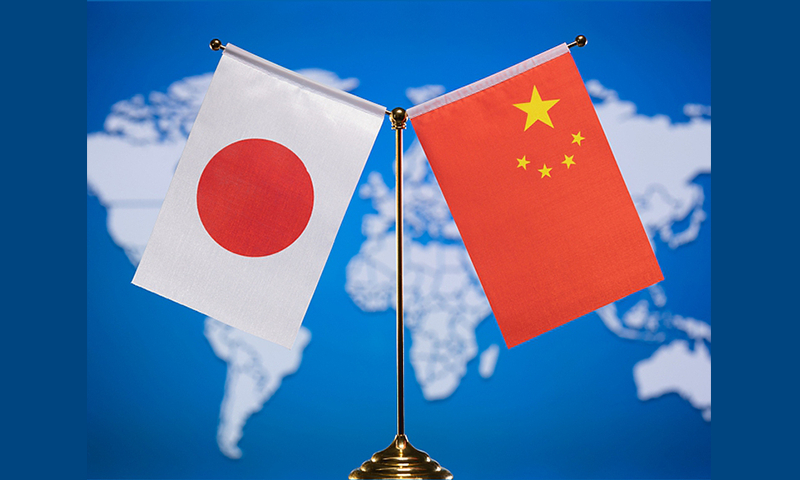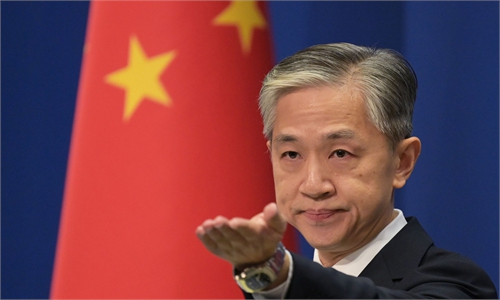Taiwan question bears on basic trust, political foundation of ties, China tells Japan at high-level dialogue

China Japan
Taiwan question bears on the political foundation of China-Japan relations and the basic trust and good faith between the two countries, Chinese top diplomat Yang Jiechi reiterated during a high-level dialogue with Japanese national security advisor Takeo Akiba on Wednesday amid heightened cross-Straits tensions.
Yang, a member of the Political Bureau of the Communist Party of China (CPC) Central Committee and director of the Office of the Foreign Affairs Commission of the CPC Central Committee, made the remarks at the ninth China-Japan high-level political dialogue that he co-hosted with Akiba, secretary general of Japan's National Security Secretariat, in North China's Tianjin Municipality on Wednesday, according to the Xinhua News Agency on Thursday early morning.
Citing a press release concerning the event, Xinhua reported that two sides agreed that the dialogue was candid, in-depth and constructive, and some useful consensus was reached. They will continue to maintain dialogue and communication.
This is the first high-level political dialogue between the two countries since February 2020.
The high-level meeting was of great significance as the 50th anniversary of the establishment of China-Japan diplomatic ties is just weeks away on September 29, and it is also highly necessary at a time when bilateral ties met serious challenges as a result of a series of negative moves by the Japanese side especially over the Taiwan question, observers said on Thursday.
China cancelled a bilateral foreign ministers' meeting originally scheduled for August 4 in Cambodia, in protest to the joint statement put out by G7 nations, including Japan, about the Taiwan region. The statement irresponsibly blamed China for tensions across the Taiwan Straits while utterly ignored the fact that it was Pelosi's provocative visit to Taiwan island that ignited the tensions.
According to the Japan's Kyodo News Agency on Thursday, their Wednesday meeting lasted about seven hours.
Da Zhigang, director of the Institute of Northeast Asian Studies at Heilongjiang Provincial Academy of Social Sciences, believed that this round of high-level dialogue was running up for the 50th anniversary of the establishment of China-Japan diplomatic ties.
"The seven-hour long meeting signals that regardless of differences, China and Japan were still able to communicate and listen to each other's thoughts with sincerity and good faith, and it will create a necessary diplomatic basis to explore ways to repair ties and resolve problems and also a needed atmosphere that answers to the interests of both China and Japan in face of complex global situation," Da told the Global Times on Thursday.
According to the Japan's Jiji Press, during the meeting, Akiba touched on tensions over Taiwan Straits following Pelosi's visit to the island. He conveyed Japan's position to highlight the importance to peace and stability across the Taiwan Straits.
Japan should focus on the fundamental and long-term interests of the two countries and their peoples, shape up a right perception of China, pursue a positive, pragmatic and rational China policy, and uphold the right direction of peaceful development, Yang said during their meeting, Xinhua reported.
He also said the Japanese side should abide by the four political documents and political consensus between the two countries, and work with China to enhance political trust, abandon the "zero-sum" mentality, properly manage differences, and promote bilateral ties to be more mature, stable, healthy and stronger.
Japan is a powerful neighbor to China and has tremendous influence in the region; but when it colludes with the US to use Taiwan question to challenge China, it is capable of causing great damage too, observers pointed out.
Challenging the very political foundation of China-Japan relations and the basic trust and good faith between the two countries, the late and former Japanese prime minister Shinzo Abe has made the infamous and provocative remarks that "a Taiwan emergency is an emergency for Japan," which has been repeatedly cited by political figures such as Sanae Takaichi, policy chief of the Japanese ruling Liberal Democratic Party (LDP) on August 5 following Pelosi's visit to island of Taiwan.
Chinese Foreign Ministry spokesperson Wang Wenbin said at a press conference on Thursday that the frequent negative moves of Japan across the Taiwan Straits have sent a "very dangerous and wrong signal" to the "Taiwan independence" separatist forces. Japan should be fully aware of the high sensitivity of the Taiwan question and the danger and harm of supporting the separatist forces in the island.
Sending wrong signals to the Taiwan secessionist forces, a delegation from Japan's House of Representatives led by former defense ministers Shigeru Ishiba and Yasukazu Hamada who later took the defense minister post again in August, also visited the island of Taiwan. Keiji Furuya, head of "Japan-ROC Diet Members' Consultative Council"—a bipartisan group of Japanese lawmakers working to advance so-called relations with the island of Taiwan - is also reportedly planning a visit to the island next week.
Japan has also been talking about making legal changes to allow the Japanese Self-Defense military transporters to evacuate both Japanese nationals and non-Japanese nationals when conflicts break out in the Taiwan Straits, which according to Liu Jiangyong, vice dean of the Institute of Modern International Relations at Tsinghua University, could include evacuation of secessionist forces' leaders.
Lü Chao, an expert at the Liaoning Academy of Social Sciences, told the Global Times that by reiterating the political foundation of China-Japan relations, China is giving a necessary head-up to Japan that Taiwan question is the red line, urging the current Japanese Kishida government to move cautiously before ties are further damaged.
During the meeting, Akiba is also believed to have expressed concern about the landing within Japan's so-called exclusive economic zone (EEZ) of ballistic missiles launched by China during its military drills around Taiwan island, Japanese media reported.
Chinese Foreign Ministry has refuted Japan's claims several times at its press conferences, saying that China and Japan have not carried out maritime delimitation in relevant waters, so there is no such thing as "Japan's EEZ" in the area.
The China-Japan high-level political dialogue, which was first held in 2015, is an important institutional arrangement to strengthen high-level strategic communication between the two countries. The eighth dialogue was held in Tokyo on February 28, 2020, as agreed in advance by the two sides.


